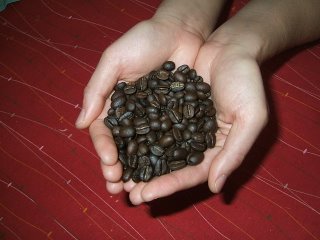Roasted Coffee Aging For Espresso
 The follow is my opinion at the moment, so it will interesting to see if my opinion will change over time. But anyway here’s my take…
The follow is my opinion at the moment, so it will interesting to see if my opinion will change over time. But anyway here’s my take…How long should we wait before using roasted coffee for espresso?
This is a question that has been on my mind for a while… few have helped. When cupping coffee or using a plunger (French press) the answer is immediately. Easy.
Let’s keep this simple and non-technical, coffee has oils and sugars and these begin to breakdown and oxidize as soon as the roasting is completed.
- Any oxygen absorbed post roasting is considered very negative… many roasters leave the bean in the open for a while here, but the evidence contradicts this practice. So once cooled the beans are best to be stored, say in a one-way value bag allowing CO2 build up to escape.
- The most delicate aromatics are the first to leave (highly volatile) and as time continues negative flavours are produced, but less volatile compounds are still preserved. The most delicate are the sweet fruity and floral ones. Dark roasting, heat, also destroys these delicate aromatics, but on the flip side, caffeine is water soluble and bitter so its content is reduced in dark roasts.
- Coffee has over 8000 different compounds, only 20% are known. It’s these compounds that provide the different aromas in coffee. Humans have different perceptions of the interaction of these compounds so it is subjective but we know that staleness is perceived by a large number of people so there is some common ground. Plus there is evidence of this process of decomposition.
- Espresso fizz begins to settle after 3 days, this de-gassing stage has allowed some decomposition of the bean, especially CO2 release, and under the pressure of extraction (8-9 bar) the carbonation effect is reduced.
- As espresso ages past the 3-day mark, the oils that make up “body” in espresso are extracted better because of short contact time with the water (a solvent).
- Coffees in espresso have still won awards at the age of 21 days. Secrets from awards winning roaster/coffee outlets have privately told me that the 9 to 14 day mark is the best time to extract. Even when stored in “ideal” conditions after 3 weeks 50% of the considered positive aromatics have escaped (in whole beans). This means that there are a lot of contradictions in espresso field.
- There is sufficient oxygen to stale coffee in vacuum packaging. There is no packaging that can ultimately preserve a roasted bean, it has a very finite life as fresh.
- Oxygen, moisture, heat, sunlight are the most negative influences on roasted coffee, storing beans in a dry, dark, cool, and closed environment during aging is important. Water must never be used to cool roasted coffee, this is a poor practice.
- Storing coffee in the fridge then seems the logical solution, not quite. Why? Because it causes fats in beans to emulsify, this denaturation of the coffee oils alters the coffee negatively and dramatically.
- Grinding, we know about this and it’s true. Surface area is increasing, allowing sensitive aromatics to escape into the air rather than into the cup.
Summary
If the most delicate flavours are the first to leave, but we know that the negative fizz of freshly roasted bean means we have to wait. So in the end the espresso does not permit these top flavours to be captured.
From what I have found by experience/experiments has been later confirmed by the research I have read to date… so my opinion is 4 days, if the bean has been store in a unopened, dark, cool environment. But (you knew it was coming), I have enjoyed espressos at that are older, the characteristics change but it is variable with age and bean type. So after all that, I say go with what you like and if anyone says there is a ‘right’ way in a product with 8000+ chemicals and with differences in human perception, you know what to think.
For Further Info:
http://www.baristamagazine.com/Issues/AprilMay05/definingfreshnes.html
http://www.scaa.org/pdfs/news/Freshness.pdf#search=%22question%20of%20freshness%22
http://www.asic-cafe.org/pdf/abstract/PC767.pdf#search=%22coffee%20oxidation%22
